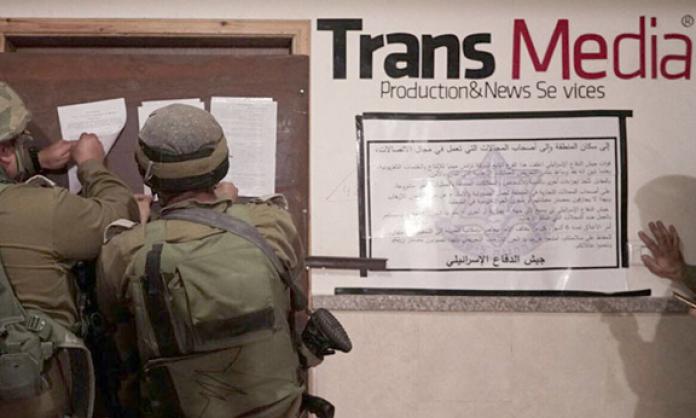Israeli occupation forces raided 10 Palestinian media offices in the occupied West Bank on 18 October, arresting several media workers, confiscating media production equipment, welding shut building doors and closing down production facilities for six months.
Carried out simultaneously in Ramallah, Nablus, Bethlehem and Hebron, the operations were coordinated by the Israeli military and Shin Bet (the secret police), who accused the targeted news agencies of “incitement”.
The raids come one month after Israel closed Palestinian radio station Manabar al-Hurriya in Hebron for six months, again on the grounds of incitement. Israel also targeted Palestinian media outlets in July, confiscating computers, hard drives and camera equipment.
The Palestinian Center for Development and Media Freedoms (MADA) condemned the latest raids and arrests, noting that among those outlets targeted were three media production companies that provide “media services to numerous TV channels”, including Palestinian, Arabic and foreign media.
According to a Middle East Eye report, two of the targeted media outlets, Pal Media and Trans Media, “provide broadcasting services, facilities, camera crews and studies to various satellite channels and international media agencies such as the BBC, France 24, Al Jazeera and Russia Today among others”.
MADA has called on international media and human rights organisations to condemn the raids and the violation of media freedom, saying that the confiscation of tens of thousands of dollars’ worth of media equipment and arrest of journalists and media workers are an attempt to “exile and silence the Palestinian media through shutting it down”.
In August, MADA noted that in the first half of 2017, Israel had carried out 127 violations of media freedom, a 15 percent increase on the first half of 2016. An earlier report by MADA documented 407 attacks by Israeli occupation forces against Palestinian journalists and media workers in 2015.
Israel’s violations include physical attacks, arrests, confiscation and detention of equipment, destruction of equipment and closure of institutions.
In 2008, the International Federation of Journalists (IFJ) accused Israel of “unprecedented and deliberate attacks on media” after Israeli warplanes destroyed the offices of Al-Aqsa Television on the first day of Operation Cast Lead. Five journalists were killed and 15 other media workers were injured.
The IFJ noted that Israel targeted Palestinian press vehicles, and said this was “evidence of the determined attempts by the Israeli authorities to control and manage the news coming out of Gaza[,] preventing important circulation of essential information on the plight of those most in need”.
In 2012 and 2014, Israel again used warplanes to control the flow of information, targeting press vehicles and buildings housing both Palestinian and foreign media. In a statement issued on 22 July 2014 during Israel’s 50-day assault on Gaza, IFJ president Jim Boumelha noted that targeting journalists is a war crime. Media workers are protected under a number of international law treaties – including the Geneva Convention and the Rome Statute of the International Criminal Court.
In the aftermath of Israel’s latest raids, the Palestinian Journalist Syndicate staged a protest in Ramallah condemning Israel’s attempt to silence the Palestinian media.










